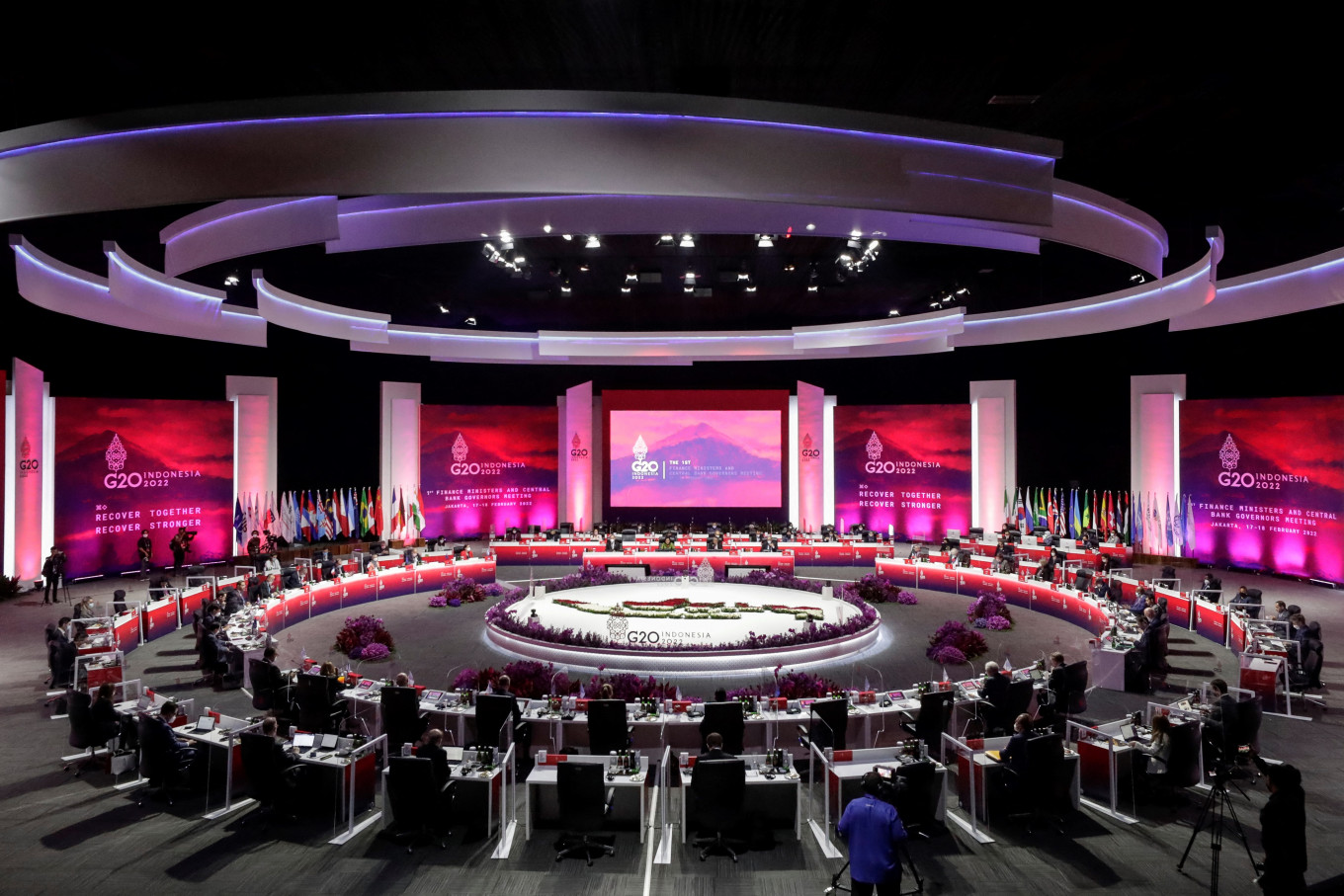Popular Reads
Top Results
Can't find what you're looking for?
View all search resultsPopular Reads
Top Results
Can't find what you're looking for?
View all search resultsIndonesia to keep Ukraine conflict off G20 agenda
Govt says it does not want to ‘lose sight’ of G20 mandate.
Change text size
Gift Premium Articles
to Anyone

Indonesia has said it will look to steer the focus of the Group of 20 (G20), which it currently chairs, to its existing priorities and ruled out the possibility of including the discussion of the ongoing Ukraine crisis into the G20 agenda.
Indonesia’s G20 co-sherpa Dian Triansyah Djani said Jakarta would remain focused on its priorities, namely global health architecture, a sustainable energy transition and digital transformation, even though Russia’s invasion of Ukraine may further disrupt the global economy that was still reeling from the COVID-19 pandemic.
“Our presidency is on track in implementing the commitments that were stated in the [G20] leaders’ declaration from the previous presidency, on top of our own priorities,” Dian told reported on Thursday.
He asked each country’s delegations to raise their concerns on all issues, not only on the Russian invasion of Ukraine, but reiterated that Indonesia did not want “to lose sight” of the G20’s founding mandate as a multilateral forum for economic cooperation.
In a statement published on Monday, the Civil Society 20 (C20), an official engagement group of the G20 comprising civil society organizations, called on Indonesia to play a more active role and invite G20 members to discuss conflict resolutions for the Russo-Ukrainian war in one of the G20 sessions.
Indonesia is currently holding the year-long presidency of the exclusive group of the world’s 20 biggest economies, which brings together not only the United States and some of its allies but also Russia and China.
The uncertainties caused by the war have pushed oil and other commodity prices higher, just as the global economy was slowly recovering from the pandemic.
President Joko “Jokowi” Widodo repeated his concerns about such uncertainties during an event organized by the Sebelas Maret State University (UNS) in Surakarta, Central Java on Friday.
He said over the past week, he had held long phone conversations with leaders of fellow G20 member states, namely German Chancellor Olaf Scholz and Japanese Prime Minister Fumio Kishida, during which the global economic situation was discussed.
“The pandemic is not over, and now there is war [in Ukraine], so everything is getting harder to predict. The things that we did not expect in the past have suddenly come to the fore,” said Jokowi.
Urging de-escalation
Earlier this week, Foreign Minister Retno LP Marsudi held separate talks with both Russian and Ukrainian envoys in Jakarta, during which she reiterated Indonesia’s position in calling all parties to de-escalate tensions, the minister’s chief of staff Achmad Rizal Purnama said.
“We also conveyed the need for a humanitarian corridor or safe passage, because it is very important now that there are millions of people [wanting to leave] Ukraine, and this is also part of our interest to rescue our citizens [in Ukraine],” said Achmad.
Indonesia’s position on the conflict in Ukraine will always be guided by its constitutional mandate and national interest, which translates to a call to respect international law, particularly respect for sovereignty and territorial integrity, and that a military attack is unacceptable, Foreign Ministry spokesperson Teuku Faizasyah said.
“That’s the principal position that we have conveyed everywhere, not only [in] Ukraine, but also [during] the American invasion or attacks on Iraq, Afghanistan and Libya,” said Teuku.
“Our position is always consistent.”
He added that Indonesia did not subscribe to unilateral sanctions made outside the United Nations mechanism and further dismissed criticism over Jakarta’s reluctance to mention Russia by name or call out Moscow’s actions as an invasion of Ukraine.
“In the UN General Assembly resolution, the term used was ‘aggression against Ukraine’ so we don’t need to be fixated on terminology, as long as Indonesia's position remains very clear,” he said.
RI’s national interest
Separately, the Foreign Ministry’s Asia-Pacific and African Affairs Director General Abdul Kadir Jailani argued that Indonesia’s national interest was to ensure international law guaranteed respect for territorial integrity and sovereignty as well as preventing practices such as remedial secession to become widely accepted.
Remedial secession refers to emerging international law principles that seek to apply the right for self-determination outside a colonial context, brought about by severe violations of human rights.
Kosovo is a widely accepted case of such a principle, with Indonesia among the remaining countries that refuse to recognize its statehood.
“In the issue of Kosovo, Afghanistan and many other intervention wars, I can tell you how we are consistent [...] when it comes to the issue of remedial secession,” Abdul said in a webinar organized by the Indonesian Society of International Law Lecturers (ISILL).
“If we allow it to happen, when a certain group makes a unilateral declaration of independence in Papua, other countries could easily acknowledge it and that is not what we want.”
He further argued that Indonesia was not “in the business of judging the conflict” and only wanted to assert its fundamental interests that “every country needs to refrain from using force and not to recognize remedial secession.”










